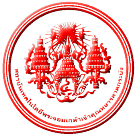King Mongkut’s Institute of
Technology Ladkrabang (KMITL) was established with the aims to provide education,
to promote research and development in science and technology for the industrial
and economic development of Thailand, and to instill a desire to serve society
in students.
The history of KMITL goes back to the establishment in 1960 of the Nondhaburi
Telecommunications Training Centre with technical support from the Government
of Japan, which later became the Nondhaburi Institute of Telecommunications.
In 1971, the Nondhaburi Institute of Telecommunications merged with Thonburi
Technical College and North Bangkok Technical College in order to form the
newly established King Mongkut’s Institute of Technology. In the following
year, the Nondhaburi Campus was relocated to a 160 hectare site in Ladkrabang
District of Bangkok and renamed the Ladkrabang Campus. The Campus began with
two Faculties: the Faculty of Engineering and the Faculty of Architecture.
In 1985, KMITL became a fully national university under the King Mongkut’s
Institute of Technology Ladkrabang Act.
The Institute’s name was derived from the name of King Rama IV. The
Royal Grand Crown seal has been graciously used as the symbol of the Institute.
The name "Chao Khun Taharn" has been used in honor of Chao Phya
Surawong Waiyawat (Won Boonnak) of which the heiress, Liam ProtPitayaPayat,
donated the land to establish the Institute.
Under the Ninth National Educational Development Plan during 2002 and 2006,
KMITL’s principal aim is to provide education and to develop resources
in order to gain academic excellency in science and technology as well as
virtue, morality and the conservation of art and culture of the nation.
In addition, the statement of the Institute’s vision includes the leading
institute in education and research in science and technology towards the
international level.
At present, the Institute consists of 8 Faculties:
• Faculty of
Engineering
Aims to produce higher quality engineers in different
fields to serve society. The Faculty provides a theory and practice oriented
background in the theory and application of modern engineering sciences. Modern
laboratory and equipment are available for students at any degree levels.
In addition, the faculty promotes and supports research activities in the
field of engineering
• Faculty of Architecture
Aims to produce both qualified undergraduates and graduates
in various fields of Architecture such as Architecture, Interior Architecture,
Industrial Design, Fine Arts, Communication Arts and Design, Urban and Environmental
Planning and Tropical Architecture.
• Faculty of Agricultural Technology
Produces qualified agricultural graduates in the fields
of Plant Production Technology, Animal Production Technology, Agricultural
Business Administration, Agricultural Development and Agricultural Industry.
The qualified graduates have been the main driving force in Thai agricultural
development.
• Faculty of Industrial Education
Aims to provide foundation courses
such as languages, humanities and social science and to produce both undergraduates
and graduates in various fields of education such as Industrial Education,
Architecture Education, Engineering Education, and Agricultural Education.
• Faculty of Science
Responsible for providing foundation courses in science
for some faculties in the Institute and for producing applied science graduates
for careers in both private and government sectors. These academic responsibilities
have made progress in science and technology oriented education which is essential
to the country development.
• Faculty of Information Technology
Established with responsibility for producing graduates
in the fields of Information Technology as needed by society in order to create
strength and advantage in the informational age competition. The Faculty,
moreover, focuses on the studies and research in information technology which
is essential to society as a whole.
• School of Graduate Studies
Aims to coordinate with other faculties to produce graduates,
to support and provide research projects and to contribute to the development
of research.
• The Proposed Faculty of Agricultural Industry
Provides studying and teaching activities in the areas
which are vital to the development of agricultural industry of the country.
The Faculty also aims to offer foundation courses in science, food science
and related technology in order to develop appropriate technology for agricultural
product processing.
The Institute has two campuses. Chumporn Campus was founded at Pa-thiw District,
Chumphon Province to extend academic development and opportunities to students
and the provide academic services for the public in the nearby areas with
the use of distance learning. Furthermore, the Proposed Rayong Campus aims
to extend educational opportunities and to provide academic services to the
community.


